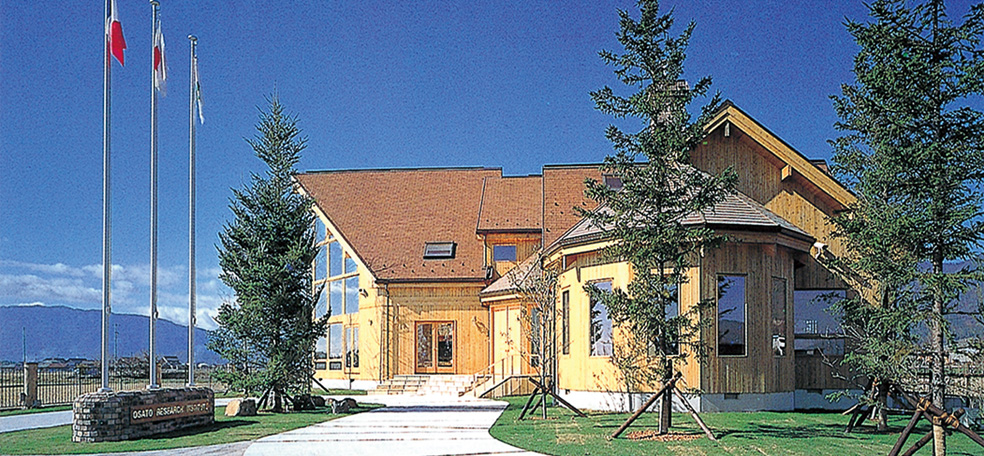About ORI
About Osato Research Instiute (ORI)
Osato Research Institute (ORI) has been conducting collaborative researches on FPP with various universities and institute in U.S.A. and Europe on the theme of
"Healthy Aging" , aimed at achieving to reduce medical costs though preventive medicine. In 2005, we established a Foundation Osato Research Institute in Switzerland in
order to make a contribution to the reduction of medical cost and/or expenses in the elderly society.
Here are our greetings, and introduction of researchers and outline of the facility.
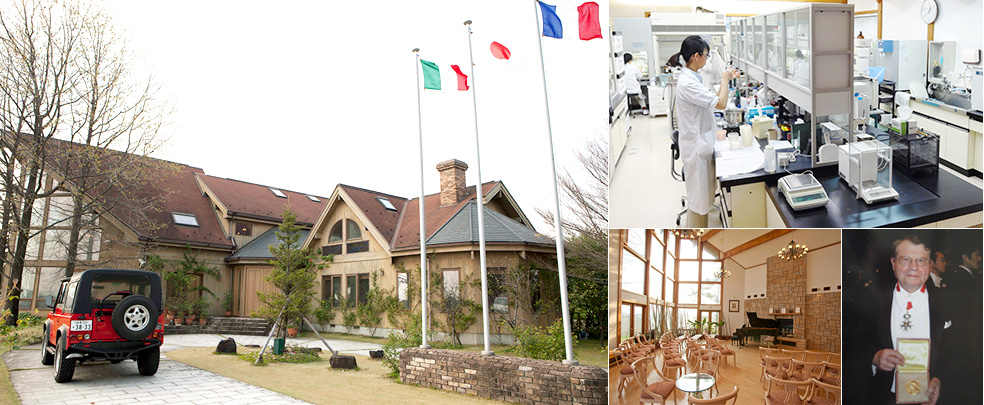
Osato Research Institute PresidentYuki Hayashi
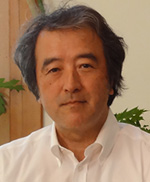
Member of president club,The Ohio State University
Secretary General, Japan Office World Foundation of AIDS Research & Prevention
Japan has become a wonderful country with a long life-expectancy, with 29.3% of the population aged 65 and over. On the other hand, the cost of medical care has been increasing every year, and if it continues to increase, the country's finances will go bankrupt. What we need is preventive medicines that can prevent illness without side effects. Conventionally, medicine is essentially prescribed based on doctors' diagnosis. In contrast, preventive medicine is designed for those who are not sick, therefore, it is not precisely in the category of medicine.
My idea of the best preventive medicine is "EDUCATION". We should provide effective dietary education to young people and let them know that we can prevent diseases by a healthy diet and way of life, which will lead to a reduction in national medical costs. AIDS is a typical infectious disease that can be prevented through education and knowledge, and the economic benefits of prevention are enormous. Professor Luc Montagnier, 2008 Nobel Laureate in Physiology or Medicine for his discovery of HIV, and Federico Mayor, ex-Director General of UNESCO, founded the World Foundation of AIDS Research and Prevention (WFARP) to encourage research in developing countries and WFARP Japan Office was founded at Osato Research Institute (ORI) in 1998 which has been engaged in preventive activities through AIDS education for children, who are the future leaders of the world.
The second possibility of preventive medicine is "FERMENTED FOOD" which has been traditionally included in Japanese daily diet. We have been conducting clinical research on FPP (Fermented Papaya Preparation) for nearly 30 years, believing that preventive medicine is the solution to reduce medical expenses in a super-aged society. FPP has been well known for many years for its "antioxidant, anti-inflammatory and immune regulating" effects. A series of clinical trials on diabetes have shown that FPP boosts immunity by promoting ATP production and mitochondrial activity without affecting blood glucose levels. The results of these studies led to the patent (Japan 2018), furthermore, the effect of healing chronic wounds was also reported. Considering that low glucose metabolism in the brain, due to aging may be one of the triggers of dementia since the brain's energy source is glucose, we have been focusing our research on dementia prevention; FPP reduces oxidative stress in patients with Alzheimer's disease and Parkinson's disease (PD), and has been shown to improve motor and cognitive function-related symptoms in PD. In addition, FPP was patented as Method for Treating Electrohypersensitivity (EHS) due to the research result of increasing cerebral blood flow of EHS patients and improving their clinical outcomes such as headache or loss of short-term memory (USA in 2021, Japan 2022). FPP was also patented as Composition for Elongating Telomere, which protect the ends of chromosomes and regulate the life span of cells (Japan, 2024).
The third preventive medicine is to provide "A PLACE FOR SOCIAL ACTIVITIES FOR SENIORS" so that they can be active even after retirement through contact with the community. In 2012, upon request of the office of Ono-town, we started "Project ORI Wine" for effective use of persimmon fields that had been abandoned due to retirement of elderly farmers. In the beginning, even a viticulture specialist from the UC Davis said it would be impossible to grow grapes, especially Pinot Noir, for Bio-wine in such a hot and humid place like Ono-town, however, we have been working hard together for our dream project. In 2019, the first wine was produced from the harvested grapes. Our project started with a 1,000 m2 vineyard, but has now grown to a 50,000 m2, while also retaining some persimmon fields. Our dream is to keep seniors healthy by involving them in our farming activity, and to use the resulting wine to support a charity for future generations.
Director of Osato Research InstituteDr. Maki Osato, Ph.D.
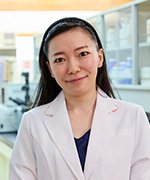
Speciality in Hematology and Oncology
Researcher of Department of Orthopaedic Surgery Nagoya City University
Promoting Health and Longevity Through Preventive Medicine
Osato Research Institute has published 54 papers in international scientific journals (as of March 2025) on FPP, Fermented Papaya Preparation, developed by the institute, through ongoing studies in collaboration with universities and research institutions in Japan, Europe, and the U.S. In addition to high safety product, FPP has been shown to improve intracellular energy production, immune function, and redox balance. It is an exceptionally unique fermented food backed by scientific evidence from extensive clinical research, demonstrating its beneficial effects. Furthermore, as a result of 30 years of research, the following patents have been obtained.
1. ATP Production Promoter, Mitochondrial Activity Promoter, and Immunostimulant
(Japan, Patent No. 6401792)
2. Method for Treating Electrohypersensitivity with FPP
(The U.S. Patent No. US10,993,980 B2)
3. Pharmaceutical Composition for Treating Electrohypersensitivity
(Japan, Patent No. 7026387)
4. Composition for Elongating Telomeres
(Japan, Patent No. 7449588)
The key to these improvements is the activation of the "Nrf2" pathway by FPP, as revealed by our recent research. Nrf2 is a transcription factor (a protein that regulates gene expression) that is activated when cells are exposed to stress or harmful substances. It promotes the production of antioxidant enzymes and detoxification metabolic enzymes, which function as the body's defense system, protecting cells. As a result, Nrf2 plays a crucial role in reducing oxidative stress and anti-inflammatory effects, which can lead to age-related diseases such as chronic inflammation, immune aging, and cancer. In addition, it maintains mitochondrial function, making it vital for maintaining cellular health.
FPP enhances the body's complex functions, such as antioxidant, anti-inflammatory, and immune-regulating activities, by activating Nrf2. In particular, FPP increases the expression of Nrf2 at the genetic level, which is difficult for typical antioxidants to achieve, and activates genes (HO-1, NQO1) involved in antioxidant and detoxification metabolism. This effect has been confirmed even in elderly individuals.
The effects of FPP not only helps prevent various diseases related to oxidative stress, chronic inflammation due to immune decline, but also enhances therapeutic effects when used in combination with medications. Furthermore, because FPP can be incorporated into daily life without concerns about side effects, it serves as a useful tool that contributes to reducing medical costs and improving quality of life (QOL).
We will continue our efforts to help people live independently and healthily for years to come through clinical research on FPP and collaboration with local senior communities. Maintaining driving ability, in particular, is crucial not only for the mobility of the elderly but also for their social connections, independence, brain activation, and the maintenance of their QOL - in other words, "self-sufficiency". Research aimed at providing support for the elderly is also underway. In addition to sharing information on FPP as a preventive measure for health maintenance, we aim to advance clinical research focused on the "recovery" of physical functions. We hope that our efforts will contribute to more efficient healthcare and improvement of QOL in our super-aging society.
Deputy Director of Osato Research Institute Dr. Kazuhiro Katada,M.D., Ph.D.
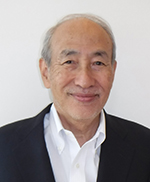
1987 Professor of the Department of Radiological Technology, Faculty of Health Science, Fujita Health University
2001 Head of the Department of Radiology, Faculty of Medicine, Fujita Health University
2014 Professor Emeritus, Fujita Health University
2014 Professor, Joint Research Course on Advanced Imaging Diagnosis, Faculty of Medicine, Fujita Health University (until 2019)
1993 The Prize of Japan Society for the Promotion of Machine Industry (DTI Minister's Award)
2009 The 8th Japan Industry-Academia-Government Collaboration Promotion Conference (METI Minister's Award)
2017 The 1st Japan Medical Research and Development Grand Prize (MHLW Minister's Award)
In the world of medicine and healthcare, it is important to always consider the side effects and adverse reactions of a medicine, as well as its efficacy and effectiveness for patients, and to maintain a balance between them. For example, in the field of radiology, I always have to consider carefully the usefulness of diagnostic imaging, as well as reducing radiation exposure and minimizing the side effects of contrast media.
In contrast, FPP has virtually no reports of side effects over its 30-year history, while at the same time it has numerous beneficial effects. It differs from conventional medicine and is a fresh surprise even for medical professionals.
In recent years, the mechanism of action has become clear, and the range of application is also expanding. The potential of FPP is currently unlimited, and at every meeting, new possibilities for its use are being discovered. I believe that the mission of the Osato Research Institute is to continue to explore the new possibilities of FPP, working hand in hand with research facilities around the world.
Researchers
FPP has gained world recognition.
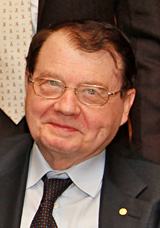
Prof. Luc Montagnier, MD 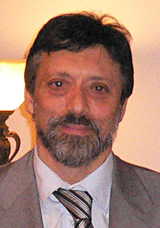
Prof. Francesco Marotta, MD 
Prof. Christiaan Leeuwenburgh, PhD 
Prof. Chandan K Sen, PhD
Outline of ORI
Osato Research Institute
Address of Swiss Foundation: Cours des Bastions 5 CH-1205 GENE`VE SWISS
President: Yuki Hayashi
| Address of the institute | 1956, Inatomi, Ono-cho Ibi-gun, Gifu, 501-0501, Japan GoogleMap |
|---|---|
| TEL | +81-585-34-3830 |
| FAX | +81-585-34-3833 |
| Director | Dr. Maki Osato, Ph.D. |
| Activity | We have been conducting researches on FPP on the theme of "Healthy Aging", aimed at achieving to reduce medical costs though preventive medicine. |
